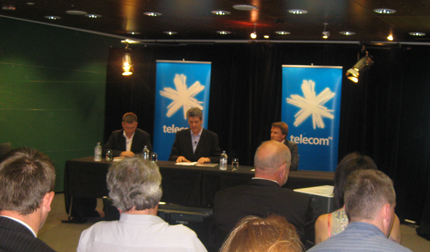Paul Reynolds: hit or miss?
NBR tallies the departing Telecom CEO's wins, and losses.
NBR tallies the departing Telecom CEO's wins, and losses.
Telecom’s CEO Paul Reynolds had his last official day at the office this week, following a cross-over month with acting CEO Chris Quin (new boy Simon Mouter starts September 1).
It’s all over bar the shouting (and Reynolds’ final payout – which Telecom won’t reveal until its annual report is released, a strong hint that it is of embarrassingly large proportions. UPDATE: It was $1.75m). So far, the Telecom boss has been mum on what he's doing next.
So how did the UK import go?
A quick summary of its greatest hits, and misses of the man paid somewhere north of $25 million over five years:
MISS: Share price since he started. On September 27, 2007 – Reynolds’ first day at Telecom, the company’s shares were trading hands at $4.47. By mid-2010, at the height of Crown Fibre uncertainty, it bottomed out at $1.89.
Every traditional telco in the world has seen a similar decline as new areas like mobile data, IT services and landline broadband are doing well, are fiercely competitive, and don’t offset the relentless decline in calling revenue, once such a reliable monopoly cash cow.. Every CEO of an incumbent carrier has the same problem, and Reynolds would have been a legend if he had found a way out. He didn’t.
HIT: Recent share price. Those who listened to Forbarr’s Guy Hallwright mid 2010 and bought below $2 would have done well. Telecom recovered to $2.55 (giving it a market cap of $4.908 billion) in late 2011 as it became increasingly clear that Hallwright’s prediction of Chorus winning the lion’s share of the rollout would come true. As of Friday’s close, S&P Capital IQ gave Telecom a market cap of $4.458 billion and Chorus $1.209 billion (or a combined $5.667 billion).

A scene from one Vector's "short straw" TV ads from 2010 (still on YouTube), when the lines company was given a good chance of winning the Crown Fibre contract for Auckland. An aggressive Reynolds said Telecom's participation in the UFB as a whole would be in question if it was not awarded the city.
MISS: Separation. Telecom had mulled a pre-emptive separation, but the spin-off of Chorus as a condition of UFB business was initiated by the government, not Reynolds.
HIT: The terms of separation. Although Reynolds was unable to change the government’s resolve to separate Telecom’s retail and wholesale/network business, boy did he get it done on good terms. Every Telecom and Chorus shareholder (if not so much the NZ taxpayer) should thank him; it’s the key reason that the Scotsman’s legacy is, on balance, positive for the company.
Reynolds had a Mexican standoff with (then) ICT minister Steven Joyce, and the minister blinked first. Telecom submitted a completely non-compliant bid, ignoring the government’s original emphasis on “dark fibre” (the most basic kind of wholesale service, favouring lines companies with their relative lack of broadband experience).
Chorus division boss Mark Ratcliffe played good cop, leading negotiations.
Reynolds played bad cop, with his give-me-Auckland-or-give-me-death brinkmanship (as the government opened UFB negotiations with Vector in our largest market) and, in parallel, threatening to compete against local fibre companies and cherry pick the most commercial business if Telecom was left out of the magic circle.
It very much got in, with $929 million interest-free government cash, with first repayments not due until 2021. Chorus is also able to offload more connection costs onto retail ISPs than Enable, Northpower and Ultrafast Fibre, the three consolation winners.
The $929 million is a mix of interest-free debt and non-voting equity. It’s been surreal to watch the Crown buying its first round of equity in the spun-off Telecom networking division this month as it struggles to partially privatise SOEs.
There was also the last minute change to the Telecommunications Amendment Act that saw the Kiwishare prohibition on foreign ownership lifted from Telecom – despite the fact the retail division remains in control of key infrastructure, including our largest urban landline phone exchanges. That could still pay off, big time, for Telecom shareholders if another carrier – or, more likely, a private equity player – swoops in and buys the company at a premium.

Reynolds, flanked by Gen-i boss Chris Quin (Ieft) and Telecom Retail CEO Alan Gourdie, at the Feb 2010 XT press conference.
MISS: The XT launch. My over-arching memory of Paul Reynold is his grim pale expression at the media conference after the second major XT outage in February 2010.
Up until that point, his various appearances had typically attracted me, someone from Computerworld, and a couple of other Fairfax business journos, plus various analysts. Suddenly, there was a bank of TV cameramen, and a crush of mainstream press. As Reynolds was looking around the room, I imagined him thinking “This is how I’m going to be remembered by most people.”
If so, he was right. It was mainstream New Zealand’s introduction to Reynolds, and it was an unmitigated disaster – and one that Telecom is still paying for today with its so-so mobile market share. Problems were compounded by the fact it came after a High Court action brought by Vodafone at the time of XT’s launch – which was resolved by Telecom agreeing to install extra hardware on its towers to prevent interference. The case gave every appearance that XT’s launch was rushed.
HIT: Fixing XT. Conspiracy theorists dined out on the fact that Telecom’s XT network was built by Alcatel Lucent – and the CEO of Alcatel Lucent was Reynolds old boss at BT. In truth, the relationship had no bearing on Alcatel Lucent being chosen as Telecom’s W-CDMA network partner. The Franco-American company had long been Telecom’s primary network partner, and planning for XT was well down the track by the time Reynolds arrived. But after the duff launch, the personal connection – or at least some strong words – was helpful. After the Telecom boss put Alcatel-Lucent on-notice, the company came through with $40 million in compensation, and most pundits (including me) would agree that XT is the fastest network, in most places, today.
.jpg)
ABOVE: August and September 2009 saw hundreds of Telecom linesmen strike.
HIT: Cost cutting. In late 2009, Reynolds publicly stood up to striking Telecom linesmen, backed by the EPMU and its then leader Andrew Little, in a successful bid to contract out $3 billion in Chorus work to Downer EDI, Transfield and Visionstream - a major restructure. Around the same time, hundreds of call centre and back-office jobs were off-shored to Manila. Both moves were controversial at the time (and of course not so flash for many in roles targeted) but things hum along quite happily in the background now.
MISS: Not enough cost cutting. More trimming followed, including a swathe of management jobs. But many still think Telecom doesn't run nearly as lean as Vodafone NZ or 2degrees. One analyst even predicted Telstra would cut up to half of Telecom's 7000 staff in the (unlikely) event of a takeover.

MISS: Tivo, getting back in bed with Sky TV: A lot of people will think, Why bother mentioning TiVo, a peripheral experiment in paid movie and TV downloads (via its Caspa service, unmetered via exclusive retailer Telecom). Or that Telecom slunk back to its Sky TV partnership (with its so far unrealised clause for a cloned MySky set-top) box after TiVo (with its lack of Prime listing and temperamental, content-starved download performance) failed to take off. Telecom senior managers seemed genuinely surprised that TiVo tanked, but it was an obvious outcome to anyone who had actually tried using the product.
Telecom split with Sky TV in mid 2009, then reunited in mid 2011 (and as the Commerce Commission is now investigating, Sky TV's partnership agreements put it very much in the driving seat, forbidding telcos and ISPs from seeking paid content from any other provider). So what? So it closed off hopes of a brave triple-play (voice, data and video) that would look very attractive for Telecom today as a buddiing UFB retailer.
HIT: The Rural Broadband Initiative: Again, there a chance for lines and pure-play fibre companies to move in on Telecom's turf.
Instead, Telecom (and now the spun-off Chorus) won the $300 millon, six-year tender to extend faster internet in a joint bid with Vodafone. The build will be funded by a levy on the telco industry as a whole (meaning the likes of TelstraClear, Orcon and CallPlus have to chip in, as well as Telecom and Vodafone themselves), plus a direct $48 million government grant.

MISS: Asking his PR gnomes to make sure he was called Dr Reynolds (his doctorate is in geology). Out of tune with the Kiwi sensibility.
HIT: The trout fishing ad. Yes, it seems hokey when you think back on it now. But it was a good mea culpa, with the copywriters somehow managing to equate giving the duff phone network another go as a measure of your New Zealandness. (Reynolds' speil in the ad: “You know, the thing I really admire about New Zealanders is your fearlessness – it’s that almost mad ‘give it a go’ mindset. And when it all goes pear-shaped, as I found out lately, there is that old Kiwi ‘pick yourself up by the bootstraps and give it another go’ sort of thinking.”) It marked the start of XT’s comeback.
MISS: Australia. AAPT shaped up a little bit, but continued to be a marginal business, worth about a tenth of the $3 billion Telecom paid for it.
HIT: Selling down Australian assets, refocussing across the Tasman. While Gattung maintained Telecom had "burned is waka on Bondi Beach", Reynolds beat a sensible retreat, selling AAPT's retail division (its wholesale buiness will undoubtably go, too, if a buyer emerges). Telecom's share in iiNet was sold. Gen-i - muscled out of CBA by Telstra - refocussed on smaller business.
So: it’s even-stevens, but I’ll use my casting vote to give declare Reynolds a hit – at least for Telecom shareholders. The terms of the separation deal – including the $929 million in no-interest, few-strings taxpayer cash for Chorus, and the removal of regulatory and Kiwishare shackles on Telecom, will be appreciated by investors long after Reynolds is forgotten.
Sign up to get the latest stories and insights delivered to your inbox – free, every day.